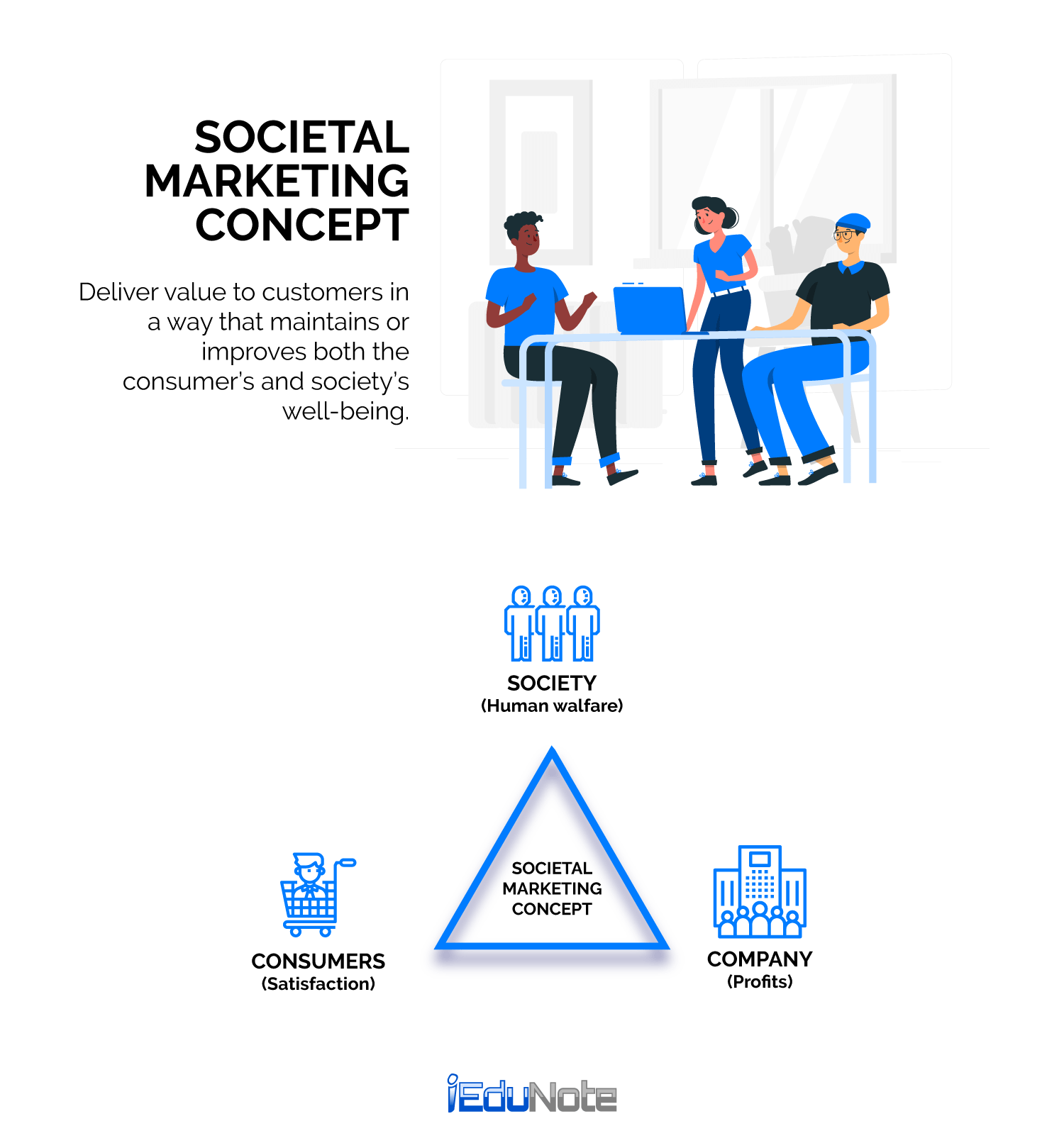The Societal Marketing Concept puts Human welfare on top before profits and satisfying the wants.
Societal Marketing emphasizes social responsibilities and suggests that to sustain long-term success, the company should develop a marketing strategy to provide value to the customers to maintain and improve both the customers’ and society’s well-being better than the competitors.
The societal marketing concept has developed from the conflict between individual consumers’ short-term needs and society’s long-run well-being.
This concept is also termed “the human concept,” “the intelligent consumption concept,” and the “ecological imperative concept.”
Societal Marketing Concept: Definition, History, Considerations, Objectives, Importance, Advantages, Instruments, Examples
What is Societal Marketing?
The societal marketing concept holds that a company should make good marketing decisions by considering consumers’ wants, the company’s requirements, and society’s long-term interests.
Philip Kotler defines it as “the societal marketing concept holds that the organization’s task is to determine the needs, wants, and interests of target markets and to deliver the desired satisfactions more effectively and efficiently than competitors in a way that preserves or enhances the consumer’s and the society’s well-being.”
Societal Marketing creates a favorable image for the company increases sales. It is not the same as the terms of social marketing and social media marketing. It is a term closely related to CSR and sustainable development.
It emphasizes social responsibilities and suggests that to sustain.
It calls for sustainable marketing, socially and environmentally responsible marketing that meets consumers’ and businesses’ present needs while also preserving or enhancing future generations’ ability to meet their needs.
The global warming panic button is pushed, and a revelation is required to use our resources. So companies are slowly, either fully or partially, trying to implement the societal marketing concept.
The societal marketing concept is one of the 5 marketing concepts.
History of Societal Marketing Concept
In the 1960s and ’70s, the unethical practices of many companies became public. The concept of Social Marketing surfaced in 1972, a more socially responsible, moral, and ethical model of marketing, countering consumerism. Philip Kotler introduced the concept of social marketing and societal marketing.
The societal marketing concept evolved from older CSR concepts and sustainable development and was implemented by several companies to improve their public image through customer and social welfare activities.
Marketers reassessed the adequacy during the early eighties of the marketing concept as a basic management philosophy. The reasons were the environmental and social conditions such as increased environmental pollution, energy shortages, population boom, neglected social services, hunger and poverty around the globe, and so on.
Martin L. Bell and C. William Emory, citing the critics of the marketing concept, maintained that customer orientation’s operational interpretation had not approached the philosophical meaning of providing long-run customer satisfaction and society’s broader needs as the ultimate marketing goal.
It is argued that the role of marketing must be related to social improvement rather than economic gain. It should also be related to human aspirations rather than only human needs and wants. Marketers should emphasize conservation rather than consumption.
They should also consider customers and themselves integral parts of the greater society, not as economic factors. Because of such demands, marketers today face dilemmas; they find difficulties determining how much emphasis is given to social consideration and how much consumer needs satisfaction.
3 Considerations of Societal Marketing Concept

Companies should balance three considerations in setting their marketing strategies: company profits, consumer wants, and society’s interests.
- Society (Human Welfare)
Companies must make sure the products, services, actions, investment innovations servers society first. - Consumers (Satisfaction)
Products and services should be satisfying the consumer’s needs. - Company (Profits)
Building long-term customer relationships, being socially responsible, and providing satisfactory products are important for profit-making and wealth maximization.
Societal Marketing Concept Video and Slideshow
Watch this video explaining marketing concepts and societal marketing concepts.
Objectives of Societal Marketing Concept
- To maintain a long-term relationship with customers.
- To create a better image in the society for the company than its competitors.
- To carry out its social responsibilities.
- Developing community awareness towards its brands.
- To carry out its social responsibilities.
- To increase the consumer base and market share.
Societal Marketing Concept Advantages and Benefits
- It helps to build a better image for the company.
- It gives a competitive advantage over the competitors.
- Useful in customer retention and long-term relationships.
- Increases sales and market share.
- Facilitate expansion and growth in the long term.
- Products and company policies should prioritize social welfare and society in general.
- Economic resources are properly used.
- Societal marketing raises the living standard of people in society.
- It ensures economic planning more significant and more fruitful to society.
Importance of Societal Marketing Concept
Societal Marketing is essential to society, the environment, and businesses. This concept was developed to tackle consumerism and profit, only the motive of business.
The societal marketing concept helps to maximize profits for the organization and creates a long-term relationship with customers.
It encourages developing products that benefit society in the long run and satisfies consumers.
Examples of Societal Marketing
The most recent examples of societal marketing are the super bowl 2017 ads of several companies.
Most ads took on issues like the environment and immigration. These come after President Donald Trump implemented executive orders that raised controversies.
- Kia’s “Hero’s Journey” commercial starring Melissa Mccarthy is the prime example of societal marketing.
- Coca-Cola releases an ad that shows people of different ethnicities and singing “America is Beautiful” in different languages.
- Airbnb’s #WeAccept super bowl 2017 ad.
- Budweiser ad showing how its immigrant founder founded a company.
Societal marketing does not stop there.
Societal marketing policies make companies actively trying to change social policy, participate in social activities, invest time and money in corporate social responsibility.
Societal marketing concept questions whether the pure marketing concept overlooks possible conflicts between consumer short-run wants and long-run consumer welfare.
The societal marketing concept holds “marketing strategy should deliver value to customers in a way that maintains or improves both the consumer’s and society’s well-being.”
Instruments of Societal Marketing
Philip Kotler identified four categories of products based on long-term benefits and immediate satisfaction:
- Deficient products bring neither long-run nor short-term benefits.
- Pleasing products bring a high level of immediate satisfaction but cause long-term harm long in society.
- Salutary products bring low short-term satisfaction to the net benefit society in the long run.
- Desirable products bring both long-run benefits and immediate satisfaction.
Based on societal marketing, Kotler suggested deficient products must be eliminated from the market.
The pleasing and salutary products need modification to bring both long-run benefits to society and immediate satisfaction to the consumer.
Meaning that these products should be launched on the market without turning them into desirable products. This way, rather than focusing on selling products, the focus is on consumer and societal well-being.

